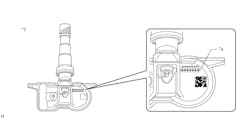Within the next two years, 87% of new cars in the United States will have the ability to transmit diagnostic and repair data via telematics, according to the Auto Care Association.
Making sure that tire dealerships and other independent auto service providers have access to that information is essential, says Aaron Lowe, senior vice president, regulatory and government affairs, for the Auto Care Association.
Access to vehicle data is “probably the most significant issue facing our industry,” Lowe told attendees of the 2019 Auto Care Association Legislative Summit this past September.
In this interview, he discusses why open access to data is important to independent tire dealers. And he provides an update on legislative efforts that would help ensure accessibility.
MTD: This past September, during the Auto Care Association’s 2019 Legislative Summit, you told attendees that “on-board diagnostic systems are already being locked down” by original equipment vehicle manufacturers. How far along are vehicle manufacturers in this process? Is vehicle data access still an “open field?”
Lowe: While in most cases, technicians can still access to the data direct from the (vehicle’s) on-board diagnostic (OBD) port, the situation is changing quickly. Manufacturers are increasing their use of wireless communications to obtain critical vehicle data, as well as locking down the OBD port in the name of cyber security. The combination of full control of wireless data and restricting access to the OBD system is rapidly making the manufacturer the gatekeeper for the vehicle, whether it is the data needed to diagnose and repair a vehicle or the ability of a fleet owner to monitor and optimize the operations of their vehicles.
MTD: If OEMs succeed in limiting or denying access to vehicle-generated data, how will this impact independent automotive repair facilities, including tire dealerships that offer auto repair service?
Lowe: Shops will need to go to the vehicle manufacturer’s cloud in order to obtain access to repair and diagnostic information that they currently obtain directly from the (vehicle’s) OBD system. Manufacturers will determine the terms and amount of data available to the independent car owners and their designated repair shop, despite the fact the consumer paid for the car.
MTD: A draft of a bill that would give vehicle owners and independent repair facilities access to vehicle data is circulating on Capitol Hill. Can you provide an update on this effort?
Lowe: We are working on sponsors for both the House and Senate. There is a lot interest, but it is unclear whether we will try to be part of a bigger bill or attempt to have it introduced as a stand-alone piece of legislation. A lot will depend on what issues (the current) Congress attempts to address.
MTD: What’s happening at the state level?
Lowe: Legislation has been introduced in Massachusetts that would require car companies to give vehicle owners the ability to control the repair information that is generated by their vehicle. The bill further requires increased transparency to vehicles owners regarding the data that is transmitted and would prohibit the manufacturers from restricting access to the OBD system on their vehicles unless it is done in a standardized way and access to the system is controlled by an entity outside of the manufacturer’s control.
MTD: How likely are other states to take up the data access banner if legislation in Massachusetts is successful?
Lowe: Our polling indicates that the measure in Massachusetts has a great deal of public support. Assuming we are successful, I believe other states will consider following the Massachusetts lead. However, a state-by-state effort will be costly and could result in a patchwork of requirements. If the Massachusetts bill is enacted, I would hope that Congress would take action to enact a national requirement, or alternatively, we would reach an agreement with the vehicle manufacturers for a nationwide rollout. Due to the extensive profits that the manufacturers are looking to obtain from the data collected from vehicles, we can expect a strong fight both in Massachusetts and in Congress against car owner control of data.
“It is important for independent tire dealers to make sure their legislators are aware of the data access issue and how it might impact competition in the repair industry,” he says. “Not only will it impact the tire dealers’ business, but it also stands to make auto repair more expensive and inconvenient for consumers.” ■




